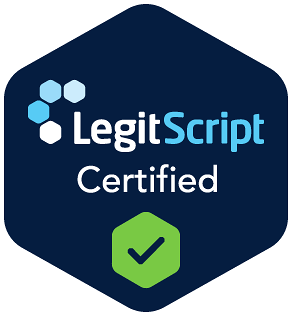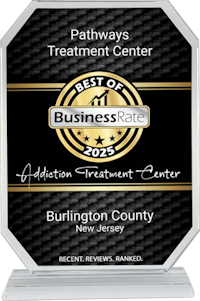OCD and Addiction Treatment in Burlington, New Jersey
If you or a loved one is battling both obsessive-compulsive disorder (OCD) and addiction, you’re not alone, and help is available close to home. At Pathways Treatment Center in Burlington, New Jersey, we specialize in treating individuals with co-occurring mental health and substance use disorders. Our compassionate, evidence-based care is designed to treat the whole person, not just the symptoms, so that lasting recovery becomes possible.
Living with OCD can be difficult to navigate on its own. When you add another condition, such as addiction, the effects can be devastating when not addressed properly. Often, the two conditions feed off one another, making it difficult to break the cycle. That’s why, at Pathways, we offer a comprehensive dual diagnosis treatment program specifically tailored for those battling both OCD and addiction.
Whether you live in Burlington or anywhere in the surrounding communities, it’s important to remember that you don’t have to travel far to get the treatment you need. At Pathways, you’ll find experienced professionals, individualized care plans, and a healing environment to help you or your loved one take the next step toward recovery.
OCD and Addiction Treatment in Burlington, New Jersey
What is Obsessive Compulsive Disorder (OCD)?
Obsessive-compulsive disorder is a chronic mental health condition characterized by intrusive, distressing thoughts (obsessions) and repetitive behaviors (compulsions). Someone with OCD will feel compelled to perform those behaviors (compulsions) as a response to the thoughts (obsessions). While these behaviors may temporarily ease anxiety, they also often interfere with daily life, sometimes to the point of being debilitating.
OCD affects people of all ages and backgrounds. While people often associate OCD with being neat or organized, for many suffering from OCD, the issues go far beyond those traits. For those suffering from OCD, the thoughts and behaviors associated with their condition are often irrational and unwanted.
As a result of these irrational and unwanted feelings, many, whether it be out of fear or simply to calm their brain down for a little while, turn to substances of abuse for temporary relief as a form of self-medication. Often, they get the temporary relief they are looking for and continue to use and abuse these substances. While it may seem effective in the short term, it starts a cycle of substance abuse and addiction in the long term and also worsens their OCD symptoms.
At Pathways in Burlington, New Jersey, we offer specialized treatment to help individuals understand the root cause of their OCD and develop healthier responses, breaking the cycle of obsession and compulsion.
OCD and Addiction Treatment in Burlington, New Jersey
Symptoms of OCD
The symptoms of OCD can be put into one of two categories: obsessions and compulsions.
Obsessions
Obsessions are recurrent, intrusive thoughts, images, or urges that cause significant anxiety or distress. These are not simply worries about everyday problems that everyone experiences. They are persistent and often irrational fears that the individual cannot simply “turn off.”
Common examples of obsessions include:
- Fear of contamination or germs
- Intrusive thoughts about harming oneself or others
- Obsessions with symmetry, order, or exactness
- Fear of committing a sin or doing something morally wrong
- Worries about forgetting to lock doors or turn off appliances
Compulsions
Compulsions are repetitive actions or mental rituals performed in an attempt to reduce the anxiety triggered by obsessions. Although compulsions may offer short-term relief, they ultimately reinforce the obsessive-compulsive cycle.
Examples of compulsions include:
- Excessive handwashing or cleaning
- Repeatedly checking locks, stoves, or light switches
- Counting, tapping, or repeating words silently
- Arranging objects in a specific order
- Seeking reassurance from others
While many people experience occasional obsessive thoughts or repetitive behaviors, those with OCD engage in these cycles so frequently and intensely that they interfere with daily functioning.
OCD and Addiction Treatment in Burlington, New Jersey
How Does OCD Interact with Addiction?
While OCD and addiction fall into two different categories of disorders, they are often linked for several reasons. Many people with OCD turn to substances like alcohol or drugs in an attempt to self-medicate or silence their intrusive thoughts and anxiety. For some, this may feel like the only way they can get relief, while others turn to substance abuse because they are embarrassed or feel shame as a result of their condition. Unfortunately, all this does is worsen their existing symptoms while also leading to the development of a substance abuse or addiction issue, resulting in the need for even more specialized and comprehensive treatment.
Does Addiction cause OCD?
It’s important to remember that while they can be connected, OCD and addiction are separate conditions, meaning that one doesn’t automatically cause the other. That being said, the reason why they are both so commonly associated is that they share similar features. Both involve compulsive behaviors, and both may be rooted in emotional dysregulation, trauma, or underlying genetic vulnerabilities.
Here are some other ways in which the two intersect:
- Shared neural pathways – Both OCD and addiction involve dysregulation of the brain’s reward and control systems. This means people with either condition may struggle with impulse control and decision-making.
- Genetic predisposition – Family history can play a role in developing both OCD and substance use disorders.
- Coping mechanism gone wrong – People with OCD may use alcohol or drugs to reduce their anxiety or “turn off” their thoughts. Over time, this pattern can become a full-blown substance use disorder.
- Social isolation – The shame and stigma surrounding OCD may lead individuals to withdraw from others, something that’s also common among those struggling with addiction.
At Pathways Treatment Center in Burlington, we often treat individuals who began using substances to cope with OCD, only to find their symptoms worsened over time. Our treatment model addresses the root causes of both conditions and provides a roadmap toward lasting recovery.
OCD and Addiction Treatment in Burlington, New Jersey
Treatment for OCD and Addiction
When someone is suffering from both OCD and addiction, it requires a specialized form of treatment that addresses both conditions simultaneously, called dual diagnosis treatment. Since for many, their addiction is directly related to their OCD, the most effective way to treat both is to address them at the same time.
At Pathways Treatment Center in Burlington, NJ, our dual diagnosis treatment programs include the following:

Treatment is not a one-size-fits-all program. While many people can suffer from the same or similar conditions, each person’s reaction to treatment is different. That’s why, before treatment begins, we do a full psychological and medical evaluation to understand each person’s situation and determine their unique needs. We assess the severity of OCD symptoms, the pattern and history of substance use, co-occurring conditions like anxiety or depression, and any underlying trauma.
From there, our clinical team looks over the results of the evaluation and designs a personalized treatment plan for each person that incorporates therapies, support services, and wellness practices tailored to their needs.
We use research-backed therapies that are proven to work for both OCD and addiction, including:
- Cognitive Behavioral Therapy (CBT) – Helps clients identify and reframe distorted thoughts that fuel obsessive thinking and addictive behavior.
- Exposure and Response Prevention (ERP) – The gold standard treatment for OCD, helping clients face their fears and reduce compulsive behaviors.
- Motivational Interviewing (MI) – Strengthens an individual’s motivation to change and promotes long-term commitment to sobriety.
- Trauma-informed Therapy – Recognizes the impact of past trauma on present behavior and incorporates healing strategies.
Medication management works twofold:
For the treatment of OCD, certain medications like SSRIs (Selective Serotonin Reuptake Inhibitors) can help reduce OCD symptoms.
As part of addiction treatment, certain medications may be administered during detox as well as the early days of addiction treatment to help address and alleviate withdrawal symptoms as part of a larger Medication-Assisted Treatment (MAT) program.
An integral part of treatment and recovery is the establishment and utilization of a support system. Group therapy offers a safe and supportive space for those in treatment to share their experiences with people who can relate since they are going through something similar themselves.
We also offer family therapy when appropriate to help rebuild trust and improve communication so that the family support system can be strong when the person returns home from treatment.
In addition to traditional methods of treatment, holistic therapies can also be beneficial, such as:
- Mindfulness and meditation
- Art Therapy
- Music Therapy
- Exercise and movement therapy
At Pathways, we know that recovery doesn’t end when treatment does. That’s why we offer detailed aftercare plans and help connect people with ongoing outpatient therapy, sober living resources, and support groups in their community, all with the goal of lifelong health and sobriety.
Receive Dual Diagnosis Treatment for OCD and Addiction at Pathways
At Pathways Treatment Center in Burlington, New Jersey, our mission is to empower individuals to overcome OCD and addiction through compassionate, integrated care. Our dual diagnosis program is specifically designed for people who are ready to address both conditions head-on and build a more balanced, fulfilling life.
If you or someone you love is facing the dual challenge of OCD and addiction, don’t wait. Recovery is possible with the right support. Contact us today to learn more about our dual diagnosis treatment programs.



